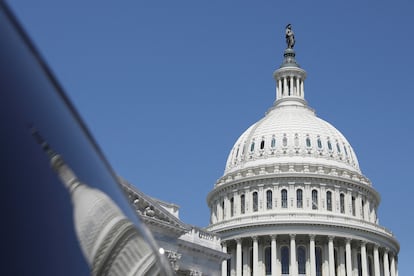Congressional Budget Office predicts slower economic growth and 4.7% unemployment into 2024
The latest 10-year budget and economic outlook from the nonpartisan office shows how difficult it is to figure out where the United States is going in the wake of the pandemic

The Congressional Budget Office reported Wednesday that economic and job growth so far this year has been stronger than forecast in February, but an updated outlook sees parts of the economy as weakening through 2024.
The latest 10-year budget and economic outlook from the nonpartisan office shows how difficult it is to figure out where the United States is going in the wake of the pandemic. Many economists and investors were caught off guard as Federal Reserve interest rate increases, intended to combat high inflation, have not led to mass layoffs and a recession. Rather, growth and hiring have stayed relatively solid.
The CBO said it expects rates to continue to rise, as well as slower growth in the gross domestic product for the rest of this year and unemployment reaching 4.7% by the end of 2024.
In February, the agency projected that the unemployment rate would jump to 5.1%. It currently stands at 3.6%. The CBO now estimates that rate will end the year at roughly 4.1%.
Consumer spending is expected to flag later this year and labor force participation to decline as employers need fewer workers.
In a bright spot, inflation is expected to decline due to actions by the Fed to tame price increases, which rose at the highest annual pace in four decades in June of last year. The central bank has tried to reduce inflation by raising its benchmark interest rates. The Fed on Wednesday raised its key rate for the 11th time in 17 months, from roughly 5.1% to 5.3%, its highest level since 2001.
The CBO issues projections that are generally more pessimistic than those of other forecasters such as the Fed. The latest report acknowledges that uncertainty, saying “projections are highly uncertain, and many factors could lead to different outcomes.”
Sign up for our weekly newsletter to get more English-language news coverage from EL PAÍS USA Edition
Tu suscripción se está usando en otro dispositivo
¿Quieres añadir otro usuario a tu suscripción?
Si continúas leyendo en este dispositivo, no se podrá leer en el otro.
FlechaTu suscripción se está usando en otro dispositivo y solo puedes acceder a EL PAÍS desde un dispositivo a la vez.
Si quieres compartir tu cuenta, cambia tu suscripción a la modalidad Premium, así podrás añadir otro usuario. Cada uno accederá con su propia cuenta de email, lo que os permitirá personalizar vuestra experiencia en EL PAÍS.
¿Tienes una suscripción de empresa? Accede aquí para contratar más cuentas.
En el caso de no saber quién está usando tu cuenta, te recomendamos cambiar tu contraseña aquí.
Si decides continuar compartiendo tu cuenta, este mensaje se mostrará en tu dispositivo y en el de la otra persona que está usando tu cuenta de forma indefinida, afectando a tu experiencia de lectura. Puedes consultar aquí los términos y condiciones de la suscripción digital.








































